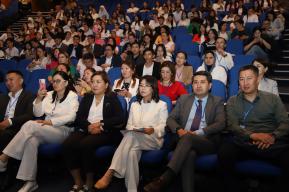
Recommendation on Science and Scientific Researchers
Transforming science for greater inclusion
For science to benefit everyone equally, we need to transform science ecosystems. UNESCO’s 2017 Recommendation on Science and Scientific Researchers (RS|SR) provides a vision for science that goes beyond growth and productivity and puts human wellbeing and inclusion at the centre.
Science with its remarkable breakthroughs can facilitate access to and improve the quality of basic services – from health, water and food, to education, cultural life and information – drastically reducing inequalities within and across countries. It can help address current and future challenges such as climate change and health emergencies. Making this possible will require a paradigm shift: justice, inclusion and human rights must become the cornerstone of the science ecosystem.

The RS|SR defines the vision and provides the operational guidance for such transformation.
- Enabling women and girls to follow a career in sciences;
- making scientific applications accessible to all;
- providing the conditions for scientists to work in freedom and safety;
- favouring trust and a science culture in society; and
- ensuring science-led policymaking
are some of the Recommendation’s building blocks.
As we protect journalists and artists, it is equally important for the wellbeing of our societies to protect scientists. Without a safe and free environment for scientists, scientific knowledge will be biased.

A game changing partnership
UNESCO and the Swedish International Development Cooperation Agency (Sida) implemented in 2021-2022 in Ghana, Namibia, Republic of Congo, Sierra Leone, Tanzania and Zimbabwe the project Strengthening STI systems for Sustainable Development in Africa. It was a unique opportunity for innovative country and global level work.

From Standards to Practice
The adoption of two new recommendations in 2021 on the ethics of artificial intelligence and on open science has strengthened UNESCO’s role as lead advocate for a human rights-based approach to science. This development benefited the implementation of the RS|SR.
Protecting scientific researchers and promoting the right to share in scientific advancement and its benefits is a centrepiece of UNESCO’s strategy. The Organization strives to render this critical, yet underdeveloped right effective. To make a difference on the ground, UNESCO develops action in four interconnected and mutually reinforcing areas:
Strengthening the review of RS|SR implementation
by supporting periodic reporting to UNESCO’s governing bodies, national reviews and the collection of disaggregated data:
- Periodic national implementation reports
- Updating of the GO-SPIN online platform
- Draft indicators' framework
- Synergies with other science recommendations

Increasing understanding and evidence
on key concepts such as freedom of science and scientific endeavours:
- UNESCO Brief on the right to science
- Experts’ insights on the right to science
- Research on scientific freedom
- Research on the status of scientists in Mongolia
- Study on SDGs and the right to science
Institutional development and capacity building
to empower key stakeholders to implement a human rights- and evidence-based approach to science.
STI project outputs in Africa:
- Multi-stakeholder consultation groups
- National benchmarking studies
- STI policies in Congo, Sierra Leone and Tanzania
- National action plans

Communication and dissemination
efforts to create a scientific culture, and appreciation and understanding of science in our societies:
- First ever MOOC on science and human rights (available in 2 languages)
- Animated video on the RS|SR
- Special social media messaging
- Promotional and agenda-setting events
- Podcast on the right to science (Spanish)
News
The Recommendation is an important standard-setting instrument which not only codifies the goals and value systems by which science operates, but also emphasizes that these need to be supported and protected if science is to flourish.
It has a particular value today, including for developing countries in building up their scientific skills and institutions. For these, it provides a useful checklist of political and institutional requirements.





